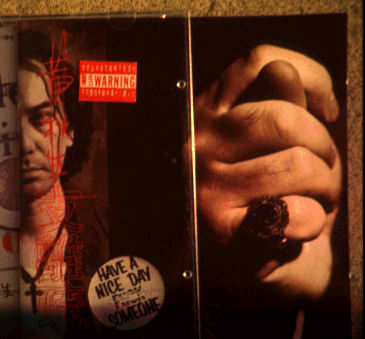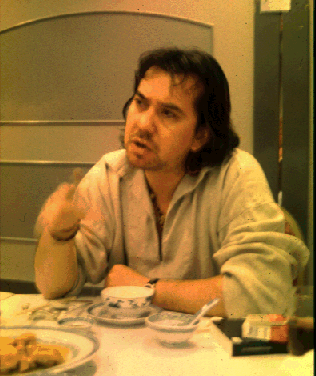


Art or trash
Use of foul language in
songs leads to debate
By Josephine Wong

M r. Anthony Wong Chau Sun’s newly released com- pact disc brings out a di- lemma between innovation in Canto-pop art and violation of moral values in society.
Foul language is used in the lyrics of some songs. An indecent gesture signifying a foul language is shown on the front cover of the compact disc.
Said Mr. Fung Lai Chi, a music critic, “He has successfully built up an outstanding style in this compact disc. He is brave enough to use foul language, which is usually forbidden in Canto-pop songs, to present his opinions in such an open manner. Most importantly, the message conveyed is unique and meaningful.”
Said Mr. Brian Leung, the music director of Commercial Radio 2: “I am really impressed by his courage to try new concepts and new style in his songs. Some of his songs are quite interesting.
“Foul language is acceptable in music. Actually it is commonly used in Western music. Mr. Wong has made a good try.”
 However, Mr. Ronny Lau, another music critic, disagreed.
However, Mr. Ronny Lau, another music critic, disagreed.
“His standpoint is not very clear. I cannot get the central idea of the compact disc. The songs are very strange and some of them are too commercial.
“The lyrics are rather cheap. In fact, I think his use of foul language is just a promotion tool to distinguish himself from other singers in Hong Kong,” said Mr. Lau.
Despite people’s attention to the use of slang and foul language, Mr. Wong denied that he put the foul gesture on the cover for promotional purpose. Only after his compact disc was released did he realize that the sign had become hot gossip.
He explained his style this way:
“I don’t mind criticism! I ignore it,” said he.
“There is too much unfairness in the world. We can hold back no more. So, why not let our feelings burst out? That is why I
 Above: Anthony Wong rebuffs his critics.
choose this foul sign — to show my dissatisfaction and helplessness towards this world.
Above: Anthony Wong rebuffs his critics.
choose this foul sign — to show my dissatisfaction and helplessness towards this world.
“The foul gesture indeed has symbolic meaning in proclaiming the message,” said Mr. Wong.
“Foul language is one of the subculture belonging to a social subgroup. It has its functions and should not be seen as something bad. We should not forbid the use of it in music.
“Art is not only to serve the upper class or the capitalists. Everyone in the world should have his own taste of art and music.
“The target audience of my music is grassroot level and young people. In order to communicate with them, I have to use their daily language — foul language and slang.
“Indeed, my compact disc does discuss political topics like liberation in China, and social issues like family problems and youth suicides. There are also global issues such as environmental protection,” said Mr. Wong.
“Hong Kong people have to face challenges and pressure every day. Each of us is bound by thousands of restrictions and problems.
problems. What can we do? We can do nothing! We can just sit at home and wait.
“It’s high time we said and did something. I hope young people today know their rights to speak up, to criticize, to laugh and to get angry. Be brave!
“As a member in mass media, I hope my songs can contribute something to the society, especially to the young generation,” said Mr. Wong.
In the upper right hand corner of his compact disc cover, there is a warning label saying that the compact disc is only for those aged 18 or above. Mr. Wong denied that this was another promotional tactic.
“This is a real warning,” Mr. Wong said. “We want to avoid unnecessary troubles. Personally speaking, I think those aged 14 or above can buy it.”
There is currently no law nor clear guideline restricting the contents of compact discs. Mr. Wong’s compact disc arouses concern about whether or not certain restrictions are needed on the local pop music industry.
Said Mr. Leung: “I think self-discipline is better than rigid control from the government. Warning label on front covers or words like ‘parental advice needed’ are already sufficient.”
Said Mr. Wong: “I am strongly against any form of restriction. I think there is no need to impose any restriction on music production in Hong Kong, since no one, except me, dares to produce this kind of music in the local market.
“I think that Hong Kong people are too conservative to accept new music style. This attitude kills new born music. Music should not be bound by any constraint,” said he.
Yet, Mr. Fung disagreed. “It is a good idea to categorize compact discs into different classes, just like the three-class Hong Kong film categorization system. This can protect the interests of different types of people.
“In the United States, compact discs are divided into two classes. I think more innovative music would appear in the local market under this system,” he said.
Despite the absence of restriction on compact discs, some of the songs in Mr. Wong’s compact disc are not permitted to be broadcast in radio stations.
While Mr. Wong complained that Hong Kong people are so conservative that creativity of music became greatly restricted, he did not show any dissatisfaction against the practice of radio stations.
“I think it is correct. Radio stations are serving the interests of all, it is unfair to force people to listen to music that may not be suitable for them,” he said.
On the other hand, he suggested that producers and lyricists should treasure the opportunity and choose whatever topics they like in music creation before 1997.
“Hong Kong music industry still enjoys great freedom now. However, after 1997, I think most of the political or sensitive issues covered in music may be banned,” he said.



